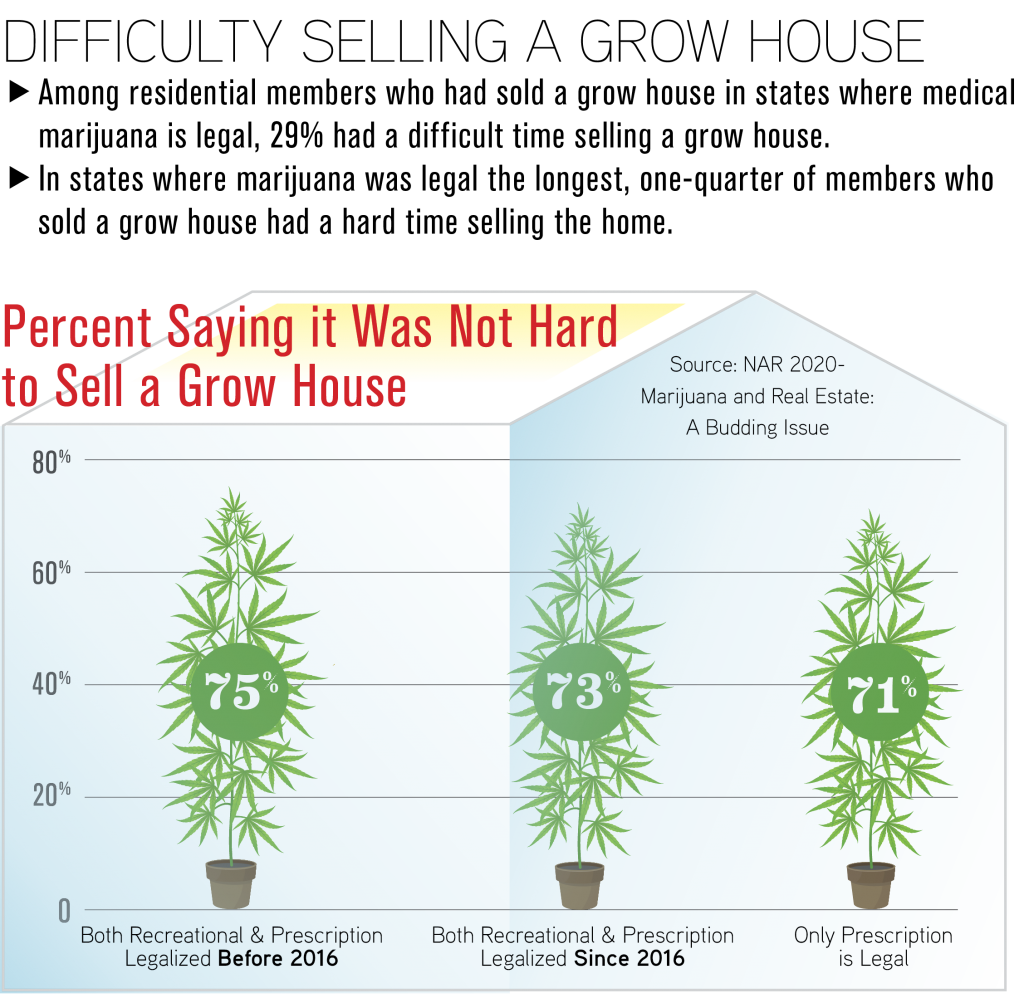RRC education on the effect of expanding marijuana legalization
By Scott Mason
It has been a long time coming, but jurisdictions throughout the U.S. are beginning to change their tune on marijuana. While California was the first state to legalize cannabis (albeit just for medicinal use) in 1996, there are now 39 states that have some form of legalized marijuana on the books.
As marijuana legalization becomes more prevalent across the country, agents must educate themselves on potential issues that may be related to the homebuying or selling process to further assist clients.

Michael Burkhard, CRS, immediate past president of RRC, recognized that these new challenges are only growing in number. “Dale Carlton [another past president of RRC] was putting together a course on marijuana and the effects it was having on the real estate industry. He asked me for my input as I’m from Colorado, one of the forerunners on marijuana legalization for both medical and recreational use,” he explained. So Burkhard and Carlton taught the class a few times together, and Burkhard has since taught the class himself, most recently for a virtual session in June with attendees based in Boston.
Burkhard went on to discuss some of the issues he touches on in his classes.
Dispensing knowledge
While experts were unsure of how marijuana legalization would affect various industries, Burkhard said that the residential real estate market has stayed relatively stable. “I don’t think the problems that people expected have been as large or as great as anticipated,” he said. “The challenges for commercial [real estate] have definitely been more difficult than for residential.”
The community agrees with Burkhard, as residential property values seem for the most part unaffected. Results from a National Association of REALTORS® survey in September 2019 showed 8%–27% of those surveyed said they’ve seen property values near marijuana dispensaries decrease. However, 7%–12% of respondents in that same survey say that residential property values have actually increased. From these results, it’s difficult to see a direct effect that legal dispensaries are having on the market, which may be good news for agents hoping for stability.
All-cash issues
One major challenge that REALTORS® may have to address is the impact on the lending/mortgage side of transactions. Since marijuana is still illegal at the federal level, financial institutions forbid the depositing of any cash earned through cannabis transactions. Any bank assisting with cannabis-related transactions can be charged with money laundering. This creates a hardship on buyers who work in the marijuana industry and makes loan approval more difficult.
Mortgage requirements may be more flexible in states that already have an established and thriving marijuana industry, like California or Colorado. A well-documented and stable revenue stream will be required, and even that may not be enough to receive approval. But buyers shouldn’t give up, as there are a few other ways to achieve the dream of homeownership:
- Co-borrowers or co-signers: Seeking the assistance of friends or family who can vouch for you financially may be a good route to take. While a co-borrower receives legal ownership rights for the property, a co-signer is not given any form of ownership.
- Alternative lenders: Local credit unions may be more likely to provide a loan than a national, FDIC-insured institution. But be aware, interest rates are usually higher when compared to big banks.
- Cash: While it may seem daunting, saving up enough cash to purchase a home outright may be the simplest solution for buyers in the marijuana industry.
For REALTORS® assisting with these unorthodox purchases, it’s always advisable to consult an attorney to further help and educate your client on the risks and requirements involved.
Interior considerations
States that have legalized marijuana often allow for plants to be grown inside of a property as well as outdoors in a garden or greenhouse. However, the risks to the property increase as the crops are brought indoors.
Marijuana plants need extensive light and water to grow properly, so an owner may create their own lighting and irrigation systems for their crops. However, many of these projects are not performed by professional tradesmen, resulting in red flags during inspections.
“I had one property where [the owners] were growing six marijuana plants in their garage, with plastic surrounding the plants to create a mini-greenhouse,” Burkhard said. “All good and fine, except that mold had gotten in and climbed up the wall in the garage. When the inspector looked at the property, he determined the mold had gone all the way up the wall and was now in the attic.” Burkhard said the buyer still bought the house, but not before expensive remediation from the sellers.
He also mentioned an example where a homeowner, evidently without the work of a certified electrician, rerouted wires throughout the house to provide increased power for marijuana lighting in the basement. “That was a huge red flag,” Burkhard said.
If an agent knows that the previous owner is growing cannabis, a thorough inspection of these components is necessary to provide buyers with a full and clear picture of the health of the home. In addition, buyers should note that average utility costs for a property may be significantly skewed as a result of the increased water and electricity use.
Knowledge is power
Burkhard points out that with legalization growing across the country, some people are specifically moving to states with the intent of taking advantage of these new permissions—and they have questions. “Agents are being asked questions about marijuana in these states, so here in Colorado, we put together a pamphlet listing all the things a homeowner can and can’t do,” he said. Similar information distributed to a potential client is useful for building a trusted relationship.
And while REALTORS® may think they have everything under control, Burkhard stressed the importance of continuing education on the subject. “[As an educator], it always comes down to how we can help CRS agents be the best they can be.”
Hidden Dangers
As former marijuana grow houses can harbor unseen structural or maintenance issues, REALTORS® need to arrange for detailed inspections of such homes and properly inform potential buyers of the home’s history. However, these grow houses may have been operated illegally, thus lacking disclosure of what modifications were made by previous owners.
The Canadian Real Estate Association released a report documenting the warning signs REALTORS® should look for when identifying a former marijuana grow house:
-
- Modified ductwork that doesn’t seem to make sense.
- Circular holes in floor joists or roof trusses from venting (look for holes that have been patched).
- Chunks of brickwork on the exterior that have been replaced.
- Brown stains in soffits, created by external venting, or brand-new soffits.
- New plumbing to provide water supply and drainage.
- Stains on basement floors caused by containers that sat unmoved for long periods of time, or stains in laundry tubs.
- Modified wiring and electrical panel. Sometimes live wires can still be in the insulation.
- Foundations and concrete walls cored or breached to get wiring around the hydro meter.
- Warped/rotted wooden structures due to excessive moisture.
Meet your Designation Maintenance requirements today! Read this article and “Urban Exodus”, take a 10-question quiz and earn 2 credits. Go to CRS.com/trs-quiz to get started.
NAR® takes a deep dive into how marijuana is affecting residential real estate. Visit nar.realtor/reports/marijuana-and-real-estate-a-budding-issue to learn more.
Photo: iStock.com/Ganna Bozhko









